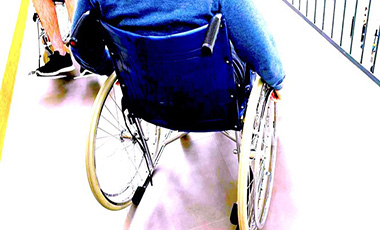Resources for Experimental Learning of the Disability Environment for the New Module (MIS20090 DESIGN THINKING)
Overview

This Learning Enhancement project has been funded through the HEA and the National Forum for the Enhancement of Teaching and Learning.
| PROJECT TITLE: | Resources for Experimental Learning of the Disability Environment for a New Module (MIS20090 Design Thinking) |
|---|---|
| PROJECT COORDINATOR: | Mr Allen Higgins |
| COLLABORATORS: | Ms Tina Lowe |
| MODULE NAME: | Design Thinking (2nd Year option/elective) |
| MODULE CODE: | MIS20090 |
| STUDENT COHORT: | 75 undergraduate students full-time (AY 2019-2020 plus AY 2020-2021. |
Background
This project aimed to demonstrate the efficacy of experiential learning to engender a design attitude among students. The design thinking class is inspired by the last several decades of shift towards socially inclusive and engaged design approaches. Human-centred design methods are gaining increased attention and design thinking has become a headline format promoted by firms such as IDEO, IBM, Google, Accenture, and EY. These organisations and others are developing and sharing their methodologies for design thinking and design processes in an open non-proprietary environment.
The class applies design thinking methods to the goal of ‘enabling organisational spaces’. The project supported the involvement of expert workshops and the acquisition of experiential teaching resources for students to experiment and props for experiential simulation of the spatial/digital environment encountered by people with disabilities. These resources included workshops, physical accessibility equipment, simulation devices, and computing device accessibility functionality for awareness and skills development. Students gain experience in requirements gathering for action research, applied research methods, data gathering, fieldwork.
This project involved the NCBI, AHEAD, the UCD Access & Lifelong Learning Centre, and the UCD College of Business.
Goals
The project sought support for the purchase of resources and learning tools for the analysis, design and redesign of digital/spatial environments impacting people with different accessibility needs.
Our goals were:
- That students could experience and learn from practical and simulated reduced access of the physical+digital environment.
- That students would gain practical experience: in user/customer facilitation sessions; gathering data for requirements; and how to run collaborative design ideation for human-centred design initiatives.
- Students on the module would actively contribute to an improved campus environment in conjunction with our partners in UCD Access and Lifelong Learning, Disability Support and campus Estate Services by preparing As-Is reports and evaluations of the spatial/digital environment to enhance the campus experience.
- That the resources funded by this initiative would be made available for others where possible and could be used subsequent iterations of the module and other teaching initiatives.
The Innovative Approach
The central tenet of the class is that “Universal Design is a Universal Requirement.” The class employs this idea of universal requirements to illustrate design processes in general and to link design thinking with design action without necessarily limiting the domain of application. (Thus they could investigate challenges equally across a range of domains - in terms of defining the accessibility context to study, i.e.: visual, audio, mobility, other; and the research subject or focus, e.g.: physical access, digital access, transactional workflows, navigating the campus, etc.).
While introducing the concepts of end-to-end design processes, the innovation in the design of this class was to employ experiential learning pedagogy. Students select one or more research methods, develop a field protocol, gather data, analyse and present the findings as inputs to a subsequent design process. They are also taught research writing techniques: citing sources, preparing bibliography, applying standard templates. The experiential learning approach facilitates the development and application of practical skills and techniques for capturing empirical design evidence and requirements. All of the preceding skills are recognised as career achievements for their personal resumés.
Future Directions
This class may offer a foundation for or lead-in to a new multi-part design studies programme; branching eventually into specialised application areas such as: built environment, digital, computing, and physical product design specialisms.
Results
The results of the learning enhancement project are expressed in student comments:
The use of the wheelchair really helped me to understand the importance of empathy in design, something that I would not have given much thought to before.
The course has also taught me valuable lessons about inclusion and equality and that are ways in which I can help spreading these lessons.
I feel like companies fail too often in understanding the people who actually use their products. There is so much missed opportunity in this area... using the props such as the glasses provided by the NCBI or the wheelchair where we got a chance to simulate to some degree, everyday problems. Things such as this forced us to think in ways we normally would not, such as 'how do I navigate from the 3rd floor to the bathrooms', etc.
...the main point that I would take forward in future would be the importance of using as many different experiences and research methods to build the best picture and then develop from there.
Resources
Teaching resources for classroom experiential learning exercises:
- Simulation Spectacles Kit – Visual impairment teaching aids.
- 2x refurbished wheelchairs for student exercises; sourced from the Irish Wheelchair Association (IWA).
- 2x Amazon Echo for use in classroom simulations and experimentation – smart assistant friendly speaker systems for handsfree and visually impaired users.
Accessible Open Learning Resource materials published by this project include:
- Publication of “Design Thinking 2 - Open Educational Resource” website. Sharing the class syllabus, readings and informational posts on Design Thinking, Universal Design, and UDL.
- Publication of the Design Talk podcast: an ongoing series of guest speaker podcasts discussing design choices and design for universal access.
Conference presentation:
Higgins, A., and Lowe, T. The design thinking class: experiencing the extremes to inform universal design. In Reconnection: Placing Inclusion at the Heart of Online Learning and Support in Further and Higher Education (East Hall, UCD, Carysfort Avenue, Blackrock, Co Dublin, 6th April to 7th May 2021 2021), N. Grennan, Ed., AHEAD Online Conference, AHEAD.